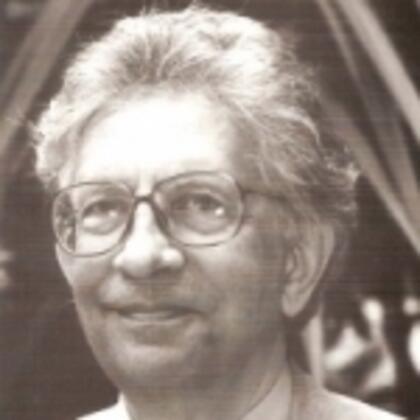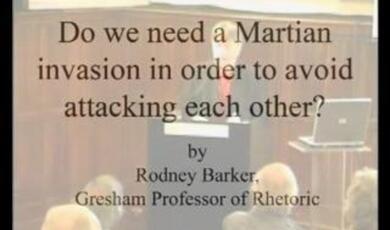If we do not survive death, is it irrational to feel dismay?
Share
- Details
- Text
- Audio
- Downloads
- Extra Reading
One answer is that even our infant selves have not survived, and that does not dismay us. Another answer is that we are not dismayed by our non-existence before birth, so why should we be dismayed at the thought of our future non-existence?
Download Text
MORTAL QUESTIONS
If we do not survive death, is it irrational to feel dismay?
Professor Richard Sorabji
In the last two lectures, I have discussed four ways in which we might be expected to survive death: reincarnation, disembodiment, resurrection, and time going round in a circle. All turned out to have their difficulties, though I did not exclude them all as impossible methods. Nonetheless, if we do not survive, is it irrational to feel dismay at that prospect? I certainly do not accept the view that annihilation would make life pointless. If there is no point in a life of four score years, it will not gain point by being prolonged, even indefinitely. But I want to consider the opposite view, that fear of annihilation, so far from being justified, is irrational. Of various reasons that have been, or might be, suggested for rejecting dismay, I shall mention some only briefly, so that I can dwell on those which I find most persuasive.
Is the flow of time real?
The fear of annihilation at death depends on the assumption that time flows. What is future becomes present and then past, and there is a constant flow in which it makes no difference whether we think of the future as travelling towards us, or of ourselves as travelling towards the future. The fear, for those who feel it, is that possibly their future will sooner or later all be over and for ever past. If time does not really flow, the fear is incoherent. For it can only be formulated in such terms as 'future', 'will', 'soon', 'over' and 'past'. Let us then consider these terms.
They belong to a group which includes the other tenses, 'was' and 'is', along with 'now', 'today', 'tomorrow', 'yesterday', 'ago', 'still to come', etc. They are to be contrasted with temporal terms like 'the year 2001', 'before the battle of Hastings ', 'after the battle of Hastings ', or 'simultaneously with the battle of Hastings '. What is before the battle of Hastings , or 2001 years after the birth of Christ, is changelessly so. By contrast, what is past, or future, or soon is not always so, but has become, or will become, or cease to be so. Hence terms like 'past' and 'future' reflect the flow of time.
These flow-related terms have a unique ability to guide our emotions and actions. It does not frighten .me if I know that December 12th 2001 is the day I die, unless I can also know that December 12th 2001 , is today and not a hundred years hence. There are also non-temporal words which guide actions and emotions in the same way, such as '1', 'you', 'here', 'this' and 'that'. It does not frighten me to know that today is the day that the Gresham Professor of Rhetoric dies, unless I can know that Iam the Gresham Professor of Rhetoric.
Have these words anything else in common? One suggestion is that they can all be paraphrased by a certain demonstrative use of the word 'this', To think of the present is to think of this time, or of the time of thisoccurrence, where 'this' can pick out any suitable occurrence, but one always conveniently available to the thinker will be the thinker's thought. To think of the past or future is to think of what is earlier or later than thistime, or than the time of this occurrence. Similarly, to think in terms of 'here' is to think in terms of this place.
Admittedly, some references to presentness will be indirect and require a correspondingly indirect paraphrase. If I think that my life will be past at some time, this reference to pastness does not mean that my life will be earlier than the time of this thought of mine. Rather, I imply that at some time someone else would be right to think of me, 'his life is earlier thanthis thought', where 'this' refers to the thinker's new thought. A converse admission is that some uses of the term 'present', although paraphrasable in terms of 'this', introduce a changeless truth, and correspondingly do not guide emotion and action, e.g. 'His death is past, present, or future'.
We are now in a position to consider the claim that the flow-related terms express a mere illusion. One objection has been that every event, for example the battle of Hastings in 1066, is all three, past, present and future, and that this involves a contradiction. But the battle is these only at different times. And no regress need start, since, if I am asked to specify the different times, I need not call them past present and future, but can simply give examples, such as the years 1000, 1066 and 2000. Examples are enough, for I am not giving a general account of what is meant by 'past', 'present' and 'future', having already done that in terms of the word 'this'.
A second objection is that although we need to make judgements of pastness and futurity, there are no facts about pastness and futurity corresponding to the judgements, because what makes the judgements true can be expressed in terms of being earlier or later than a given thinker's thought. But it seems to me that the person who does not know that the day of his death is today is best described as not knowing a certain very important fact.
A third objection is that there might well have been no conscious beings in the universe, and at least in that case, there would have been no past, present, or future. For my account of the three terms 'past', 'present' and 'future' introduces the demonstrative word, 'this', which only confirms how egocentric the three terms are. In a universe without conscious beings who could think in demonstrative terms, the word 'this' would have no application. I believe that this objection is mistaken in at least two ways. For one thing, if we think that in that universe, there might .have been no people up to now, this reference to our now does not smuggle us illegitimately into the imagined scene, but only relates the imagined scene to the time of us who are imagining it from the outside. Secondly, if we have the thought that in that universe, as in ours, events would come to be past and over, we would be imagining what could have been said, if within that person-less universe there had after all been a person. That person would have been able to think, 'so and so is over,' i.e. to think, 'so and so is earlier than this time'. Once again, this is not illegitimately to smuggle an actual observer into the observer-free scene.
A final objection is that Relativity Theory gives a complete account of time without making use of any of the terms related to flow. But the answer is that the account of Relativity Theory is incomplete, insofar as it does not cover the temporal notions which physicists need in order to carry out their experiments, and one of these notions is 'now'.
The fear of annihilation would indeed have been incoherent, if the flow of time had been unreal, but I have not been able to see how it can be unreal.
Immortality boring?
There has been another reason for regarding the fear of annihilation as irrational. It has been said that immortal life would be boring, and the case of Elina Makropoulos has been cited. Having taken an elixir at the age of 42 which maintained her with the attributes of a 42-year-old, she decided at 342 years to die, because her life was so boring. But in the story told that way, there are several mistakes. First, even if immortal life was boring, that tells us nothing about whether annihilation is not also an evil to be feared.
But worse, Makropoulos' mistake was to rule out progress by remaining with the attributes of a 42-year old. The very antithesis of this is the view of St Gregory of Nyssa in the 4th century AD, who looked forward after death to a life of perpetual progress, on the grounds that there would be an infinite amount to discover, in his view to discover about God. Gregory of Nyssa thus cleverly avoids both boredom and satiety. Why indeed should there not be an infinite number of things that it would be worthwhile coming to understand, and an infinity of interactions between persons in which it would be worth engaging? None of this is to deny that a community in which everyone was immortal would have to be very different from any we know. There could not be careers, marriages, or families, as we know them.
Escape from time preferable?
Another view is that everlasting life is to be avoided, because it is a life set in time, whereas the truly happy life escapes from time. This is the view, for example, of Plotinus, the founder of Neoplatonism in the 3rd century AD, and of the mystical tradition which he influenced. It would incidentally exclude boredom for another reason that there would be neither passage of time, nor sense of it. Plotinus took the sense of timelessness which mystics experience as evidence of what reality was really like, not as an illusion from which one returned to reality. Influential as his idea has been, I confess that I have not been able to understand it. The kind of life to which we aspire would have to involve consciousness, and I have not been able to see what it would be for consciousness not to occur in time. In Plotinus' view, although this was contested, timeless consciousness is uninterrupted; it is only our attention to it during life that is intermittent.
Contentless consciousness is all there is
There is a strand in Indian Philosophy that would challenge the assumption I have just expressed, that the life to which we aspire would have to involve consciousness, if that is consciousness of things, as we normally understand it to be. Yoga is not just a practical, but also a metaphysical system and the Samkhya Yoga of Patanjali, as amplified in a commentary of the 4th century AD, adumbrates a view of consciousness and self that was developed more fully by the Advaitans from Sankara in the 8th century AD onwards. Everything is reducible to one thing, Brahman. One's self is one's consciousness, but these are really Brahman. Moreover, that consciousness is not consciousness of things, but only of itself. Consciousness of other things due to embodiment is not real, and to understand this is liberation.
The Nyaya opponents of the Advaitans raised an objection to such self-consciousness, curiously like that which Plato had also raised, when, much earlier and quite independently, he considered self-consciousness of this kind. If there is no consciousness of anything else, self-consciousness will not have anything to be conscious of - it will have no content. Seeing was an example used by Sankara to illustrate his type of self-consciousness, but it had also been used as an example on the other side by Plato. We might put the difficulty by saying that seeing needs to be directed to qualities like colour, light and shade. If there was no seeing of colour, light and shade, sight could not see itself operating, for there would be no content for it to get hold of.
Another Indian system, Mimamsa, concluded that in liberation there is no kind of consciousness at all. But the Advaitans tried to insist that the idea of such consciousness was coherent, although they conceded that the consciousness could not be experienced.
Such a bald summary of vast systems of thought and controversy cannot hope to be accurate or to express understanding. But all I need say for our purposes is that the fear of annihilation depends on the fear of losing all consciousness and selfl1ood as we know it. If we could understand how consciousness and selfhood are very different from what we suppose, we might well find that our fear of annihilation is misconceived.
No continuous self
There is a view of the self with which some of you will be familiar from my inaugural lecture last year, and with which I am more familiar because it is reflected in Greek and Latin writers of the first century AD. It is set out in a Buddhist work written in Pali, whose core dates from Milinda's time, the 2nd century BC, The Questions of Milinda. Milinda was a Greek, Menander, King of Bactria, the region near the meeting point of modem Afghanistan , Pakistan and India , who is represented as putting questions to a Buddhist monk. The Buddhist explains that there is no continuous self and that, on realising this, one will not in the same way fear death, and will also not in the same way be selfish, because both attitudes rest on an illusion about selfhood.
The Buddha himself, it has been argued, in the fifth century BC, intended no such thesis, but was only objecting to the metaphysics of the self as identical with Brahman, which he found already adumbrated in the Upanisads, the Indian scriptures of the 12th to 8th centuries BC. What he did insist on was the uncontroversial point that our physical characteristics change and decay, and that our mental experiences have an even shorter span. Moreover, he thought that we consisted simply of five bundles of processes, one physical and four mental. It was later Buddhist texts which developed the stronger denial of continuity. One objection to the denial of a continuous self, expressed in an unqualified way, is that life itself would be impossible if we were really able to adopt it. The infant needs to be able to see itself, even if it cannot yet think, as having got back to the safe place where it was before, or as avoiding getting back to a danger it encountered earlier. This already involves seeing the world as interacting with a continuing self. We could not carry out any project at all, not even the project of arguing against a continuous self, if we did not see ourselves as continuing. The Islamic philosopher Ibn Sina (Avicenna in Latin) had it exactly right when the Buddhist view was put to him by a pupil in the early 11th century AD.
'Master', said the pupil, 'what do you think of the view that there is no continuing self?' Ibn Sina did not answer, and when asked why he was silent, replied, 'I only answer the one who put the question'.
The unqualified view would be hard to square not only with the Buddha's life story, but with his ethical views, or with any ethical system at all. It has been suggested by modern commentators that there may be advantages in an ethics which does not make the idea of a continuing person central. The Buddhist can oppose suffering, wherever it is found, not just in persons, but in animals too. But almost any imaginable suffering is spread over time and has to befall a suffering subject which lasts through that time. There are other ethical issues which even more evidently, involve a continuing person: responsibility for what you did, reward, compensation and punishment, or promises and commitments about what you will do, including the commitment to reduce suffering. Buddhism itself sees present suffering as originating from wrongdoing in a past incarnation and right conduct as possibly leading to alleviation in a future incarnation.
These moral questions are addressed in Chapter 15 of Derek Parfit's book, Reasons and Persons, which we encountered in the first of this year's lectures on mortality. Parfit's view is that when we talk about the same person over a period of time, all we actually have is degrees of psychological continuity between the earlier and the later person. There is not strict identity between the earlier and the later person, because identity does not admit of degrees. We also find cases in which there is no answer to the question whether we still have the same person or not. This leaves Parfit perfectly able to address the moral questions we have mentioned, but his answers to them are unexpected, because they too bring in the idea of degrees. Thus a person may deserve less punishment for a crime committed by his younger self, since the younger self is related to him only by degrees, and not by strict identity. Equally, he isless morally bound by a commitment which his younger self undertook for the same reason. It may be less fair to impose a burden on a child so that his adult self may benefit, because again the adult self will be related only by degrees. On the other hand, because his life is not entirely unified, it may be less important that his later self should be compensated. Moreover, if someone else gets the compensation, that person will differ from his present self only by lacking a degree of psychological continuity. Finally, if lives are only to a degree unified, we should perhaps in relieving suffering pay less attention to how much someone has suffered over their whole life, and consider only suffering at a moment. Although this would leave some people enduring a monopoly of suffering over their lives, that fact would be less serious, to the extent that the lives were not unqualifiedly one.
Evidently, Parfit's discontinuity of the self, like the Buddha's, is sufficiently qualified to accommodate his ethical views. But I am not persuaded that his account of the self sufficiently allows for our need to think in terms of '1' at different times. The notion of '1' is not, of course, captured in terms of psychological continuity. If I know that someone who has certain psychological continuities with my present self is in danger of being run over, I do not yet know whether I am in danger. Moreover, I attach - importance to that question independently of the degree of psychological continuity that the victim might have. If I did not, I would not for long be successful at staying alive.
Psychological continuities decline quite quickly, on Parfit's view. Concern for 'I' needs to last much longer. In having to see the world in terms of '1' at various times, one is not committing oneself to any particular metaphysics, as parfit believes his opponents are, not for example to Descartes' belief in a purely mental ego.
This is not to deny Parfit's exhilarating skill at imagining extreme conditions in which normal ways of thinking really would break down. The person who is wondering whether to be electronically 'beamed up' or 'teletransported' to the planet Mars, without his present body, may well wonder, 'would it be 1 who arrived?' and there may not be a definite answer. The person who foresees being split into two by brain
surgery might begin thinking in terms of 'we', even if he considered that neither of the two distinct persons was going to be strictly identical with himself. 1 am not sure, however, that in any of the scenarios envisaged, a person would think, 'it is a matter of degree whether it will be I'. 1 am not sure that 'I' admits of degrees.
What matters, however, is what is implied for normal conditions of living. Parfit believes that psychological continuity declines comparatively quickly. I would have thought that childhood experiences were more deeply ingrained, but if Parfit is right, I believe that that does not, and should not, affect our thinking in terms of 'I'. If it did, I think it would not lead us to talk in terms of degrees of I, but would, for example, lead us to wonder, like the subject of teletransportation, 'will it be I?', or even to answer 'no'. But this would interfere, to take but one example, with our projects, with projects of protracted learning or apprenticeship, with plans for career or marriage, hopes of solid achievement, plans for insurance and pension, and equally with plans for change and variety, with plans for having children after career, plans to switch career every five years, plans to travel to every corner of the world. I do not believe that the mere prospect of normal degrees of psychological discontinuity would or should lead us to stop thinking in terms of 'I'.
This in turn means that I do not see a way of following the view of Buddhism and of Parfit, which the fear of annihilation at death depends on a misconception about the continuity of the self.
Self continuous with others
There is another way in which the significance of the self can be reduced, not by questioning its own continuity over time, but by questioning the extent of its discontinuity from others. To some extent, the first involves the second, but the second type of questioning can be conducted independently. The Stoics already emphsised in their Ethics that we are only parts of a whole, like mutually supporting stones in an arch. The Neo-Platonist, Plotinus, took this further, being attracted by the idea, but also resistant to it, that we all share the same soul. But the strongest sense I have ever got of the unity of all things was from an exhibition of American Indian poems, sayings, and customs, in the American Indian anthropological museum in Santa Fe . According to the presenters, hunters thought of themselves as needing to conduct a ceremony before it would be permissible to draw energy from the victim to themselves. Grinders of grain saw the grinding as making the very grinding stones happy. Dancers felt that everything was joining them in their dance. At death they saw themselves as returning to the earth from which their ancestors had sprung. The sense of unity would not be accessible to our culture, but might surely reduce the sense of personal loss, if they expected to lose such individuality as they had had.
Past non-existence is no evil
I come finally to the view that I find most useful. It is that we do not feel horror at our past non-existence before our birth, so it must be irrational to feel horror at the prospect of future non-existence, since the two are mirror-images of each other. This argument was cited by the philosopher David Hume on his death bed to Boswell, the biographer of Dr Johnson, but it did not relieve Boswell of his fear. The argument is sometimes attributed to Lucretius, who put his Epicurean Philosophy into Latin verse in the first century BC. In Book 3 of On the Nature of Things, lines 972-7, Lucretius says:
Again, look back and see how the ancient past of everlasting time before we are born has been nothing to us. Nature then shows us this as a mirror of future time after our final death. Does anything appear horrible there, does anything seem sad? Does it not stay steadier than any sleep?
Lucretius may, however, only be repeating the point he made at lines 834-42 about actual suffering, that we did not experience any suffering in that past, and equally will not in that future.
One attempt at reply would urge that it is conceptually impossible to feel horror at past non-existence, and so our differential dislike of future non-existence is logically inevitable. I do not agree with this, although there is a merely verbal truth, that we do not use the word 'fear' in relation to past evils. But that is why I used the word, 'horror'. Whether horror at past non-existence ever occurs in actual fact is a different question. The closest I have found is the case of Nabokov, who in his autobiographical work, Speak, Memory, describes someone who was horrified to see a home movie taken a few weeks before he was born:
He saw a world that was practically unchanged - the same house, the same people - and then realised that he did not exist there at all and that nobody mourned his absence. he caught a glimpse of his mother waving from a upstairs window, and that unfamiliar gesture disturbed him, as if it were some mysterious farewell. But what particularly frightened him was the sight of a brand-new baby carriage standing there on the porch, with the smug, encroaching air of a coffin; even that was empty, as if, in the reverse course of events, his very bones had disintegrated.
I am not sure that even here we have an exact mirror-image of horror at the prospect of future non-existence. For his horror was at his not existing and not being missed in that particular environment - one where he felt he should have belonged. There is no sign that he would have felt horror at his absence in the more remote past. For something closer to this, we might consider the horror that some people feel when they think of the infinitude of time and feel their own brief existence dwarfed by it. Here the infinity of past time before their existence is just as effective a source of horror as the infinity of future time, although the horror is not at the past non- existence, but at something else which partly depends on the past non-existence. The horror evoked by reflection on past non-existence could even be greater, when one reflects that a tiny turn in events could have brought it about that one never came into existence at all, whereas at least this horrifying possibility is excluded, when one thinks about future non-existence.
Here too the horror is at something else which depends on past non-existence. But whether or not there are actual examples of straightforward horror at past non- existence, the important point is that such horror is, as far as I can see, conceptually possible.
A second attempt to answer the 'Lucretian' argument would object that an attitude cannot be dismissed as irrational merely because it is not based on a further reason. Probably those who feel horror merely at the prospect of future non-existence have no further reason for their fear. But then, if we are to avoid an infinite regress, we must just see some things as preferable to others, without further reason, and to do so is not in itself either rational or irrational. But this reply misses the point of the 'Lucretian' argument, which is that our preference for past over futurenon-existence is a preference between things which are mirror-images of each other. In other cases where we prefer one thing to another without further reason, the choice is at least between things which are not alike.
The only qualification I had to offer, when I first considered the 'Lucretian' argument was that our greater dislike of future non-existence is not surprising, because it is simply one example of a much more general preference. Take the analogy of friendship. There was a time before we got to know our friend, but we do not normally think this fact an evil, unless there are special circumstances. But we do think a permanent separation in the future to be an evil. The analogy is still closer. For we do not, except in a very intimate friendship, think it an evil if our future associations are intermittent. In the same way, many of those who fear annihilation would not mind an intermittent future existence, interrupted by periods of suspended animation, just so long as their existence did not come to a permanent end.
There is indeed a very general tendency to give a preference to one direction or the other in time. Thus we are not interested merely in thequantity of good things in our lives, but also in the order in which they come. Any sensible person would prefer a life of promotion to a life of demotion, even if the life of demoton started at the top, and included the same total quantity of advantages. Gregory of Nyssa in the fourth century, AD, to take a more sublime example, was attracted by a future of perpetual progress in understanding, not by one of perpetual regression albeit containing the same total quantity of understanding. We must discount complicating factors such as the thought that the progress is due to one's own efforts and the regression to one's lack of effort. But when such allowances have been made, I think that preferences concerning temporal order and direction will turn out to be so widespread, that we would hardly be human without them.
Moreover, something has caused this to be the case: natural selection. Animals which minded past pain or danger more than future would not fare well in the evolutionary process. This provides a causal explanation of some of our preferences, although it does not identify our reason for having the preference. Indeed, we may have no further reason.
When I first offered these arguments in Time, Creation and the Continuumin 1983, I intended to concede that all these preferences were irrational, but to say on the other side that none was surprising, because the type of preference was so widespread. Since then, Derek Parfit's book, Reasons and Persons, has expressed a seemingly opposite conclusion, that the bias between future and past is not irrational, pp.174- 186, esp.186. But in fact, I think we were doing exactly the same thing, namely arguing that the bias between future and past is not confined to the context of death, but is a very widespread human phenomenon. I concluded merely that we should not find any instance of something so widespread surprising. But I still called all the instances irrational, because it is not self-evident why mere position in the past or future should be important. I could, however, just as well have said that natural selection has caused us to treat position in the future or past as a reason for different reactions, so that the preference in the particular case of death is in a way rational.
If natural selection has made us feel this preference in the case of death, how can it reduce our fear to learn that the preference is irrational, or at least something which we are caused by evolutionary forces to treat as having a reason? I do not think it can remove the fear, because those who feel the fear have had the fear programmed into them. So I am not surprised that Boswell was not comforted. With fears that are not so strongly programmed, I believe that Philosophy can often help. But even here, I think that Philosophy can still do something. By making us see that the fear is, in the sense I explained, irrational, and merely the product of evolutionary forces, it can help us to take our own agitation less seriously. It makes fear worse if we feel that the fear is justified. The 'Lucretian' argument that the fear is not justified does not remove it, but it can keep it in check and prevent it growing.
What I see as the ideal attitude is to think that what matters is not the location of our life in the flowing series of past, present and future, but the quality of our life. And even though something stops many of us feeling that way, I stick to the thought that that would be the rational way to think.
© Richard Sorabji, Gresham College , 12 December 2001
This event was on Wed, 12 Dec 2001
Support Gresham
Gresham College has offered an outstanding education to the public free of charge for over 400 years. Today, Gresham College plays an important role in fostering a love of learning and a greater understanding of ourselves and the world around us. Your donation will help to widen our reach and to broaden our audience, allowing more people to benefit from a high-quality education from some of the brightest minds.


 Login
Login







